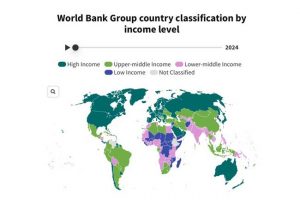Sri Lanka – Catholic Church proposes a stable policy and Commission for the upliftment of Plantation people
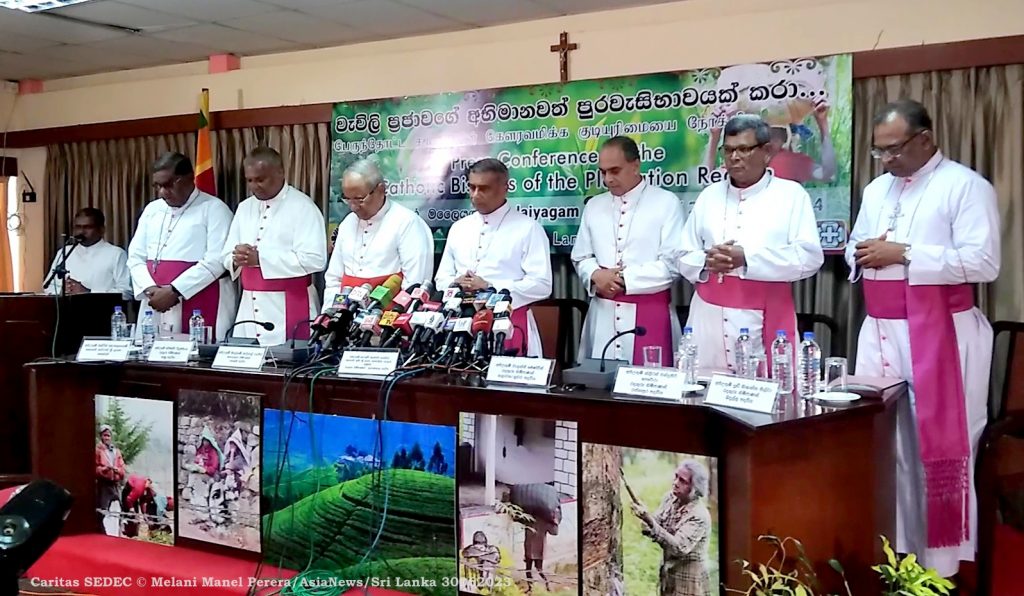
Colombo – The Plantation Community who have been sacrificing their lives for the economic survival of Sri Lanka for the last 200 years, due to the lack of a stable policy in estate management, they live oppressed lives in unstable schemes. The Catholic Bishops’ Conference together with the Caritas SEDEC calls on the government a stable policy of management and a commission for a proper in-depth investigation of them in order to give them the dignity they deserve as human beings.
The theme of the event was ” Towards proud citizenship of plantation community…” 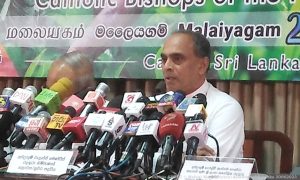
With the participation of the Archbishop of Colombo Cardinal Malcolm Ranjith and the Chairman of the Catholic National Commission for Justice, Peace, and Human Development, and the Bishop of Jaffna Justin Gnanapragasam, the Catholic bishops representing the plantation areas in Sri Lanka held a special press conference and gave a depth explanation of their findings on the social and economic problems in 05 main fields faced by the plantation people living in this country for 200 years.
The Bishops of Kurunegala, Kandy, Badulla, Galle, and Ratnapura explained the problems faced by the people of the plantation areas they represent in the 05 sectors of the education sector, health and sanitation sector, livelihood sector, housing, and land as well as plantation community traditions and cultural heritage and this special press conference was held at the National Caritas SEDEC in Borella, Colombo 08 on June 30th in the afternoon.
 “Not only plantation workers but other workers in all fields have become slaves of neo-colonialism. We have identified plantation workers as the first victim group. That 200 years ago, the plantation workers who were brought to Sri Lanka as slaves were not paid proper wages and were used as cooks without proper housing.” addressing media said by Archbishop Cardinal Malcolm Ranjith.
“Not only plantation workers but other workers in all fields have become slaves of neo-colonialism. We have identified plantation workers as the first victim group. That 200 years ago, the plantation workers who were brought to Sri Lanka as slaves were not paid proper wages and were used as cooks without proper housing.” addressing media said by Archbishop Cardinal Malcolm Ranjith.
Using those people as their cooks and servants, the white planters taught their culture to the planters in this country, and following that teaching, the present-day companies are also exploiting them in the same, the bishop said.
Archbishop Malcolm Ranjith stated that their problems cannot be solved by only providing houses, repairing roads, building toilets for them, etc., and said that the rulers of this country should understand deeply about the pathetic lifestyles of the plantation people who sacrifice their labour and lives for a meager salary.
The Archbishop said that the Plantation workers should be fearlessly accepted as a part of the lifeline of this country, and should be treated in such a way as to protect their dignity.
“But it is impossible to accept the current situation where the farmers are not treated like that,” said Cardinal Ranjith. 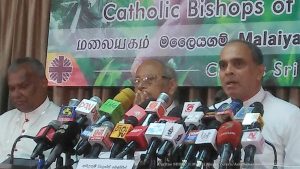
At this moment completing 200 years, understand properly what is the basic right and self-respect of these people. Understand exactly what their need is. Look straight at the peasants, fishermen, and other working people who have fallen into the abyss as well as the plantation community, and uplift their lives, addressing the Sri Lanka government, said Cardinal Ranjith.
 Speaking to the media about the conditions in their fields, all the Bishops said that these estates did not create a background for the Tamil people to rise above the situation they are in. In order to break that injustice, the authorities, the existing government should be active immediately.
Speaking to the media about the conditions in their fields, all the Bishops said that these estates did not create a background for the Tamil people to rise above the situation they are in. In order to break that injustice, the authorities, the existing government should be active immediately.
“Even though it is late at this time of 200 years, we demand that the authorities of this country should take positive steps to live as Sri Lankan citizens by giving them the respect they deserve. The people of the country and the media have a duty to pressure authorities to provide that justice to them,” said Bishop Harold Anthony Perera the Bishop of Kurunegala and President of the Catholic Bishops’ Conference to Asia News Service.
A decision was taken by the government about two to three years ago that the daily wage of plantation workers should be 1000.00 rupees, but even at present that decision is limited to words only, and the number of working days of some plantation workers who are given a 1000.00 rupees per day has been cut. That means, again they get that petty amount as the daily wage.” told Bishop Valence Mendis the bishop of the diocese of the Chilaw to the media.
Bishop Valence Mendis explained that due to the fact that these plantation people are not connected to the government’s administrative structure, their needs such as houses, toilets, and roads are not being fulfilled properly.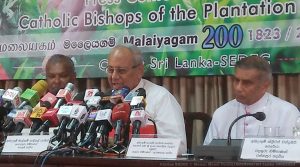
Bishop Mendis also pointed out that although the majority of estates are under private companies, the government should negotiate with those companies and come to relevant agreements for the betterment of the estate people.
Bishop Mendis mentioned that 40,000 houses had been given by the Indian government in the past, but even today they have not been handed over to the people in some places, He emphasized that the government should have some program to provide shade to these poor people who are mainly engaging the country’s economy.
Speaking to the media, Bishop Jude Nishantha Silva, Bishop Raymond Wickramasinghe, and Bishop Cletus Chandrasiri also revealed the problems faced by the plantation community in their provinces.
The Bishops and the Caritas SEDEC also offer recommendations, for solutions to all the problems stated by the bishops in front of the media faced by their estate community.
END.






